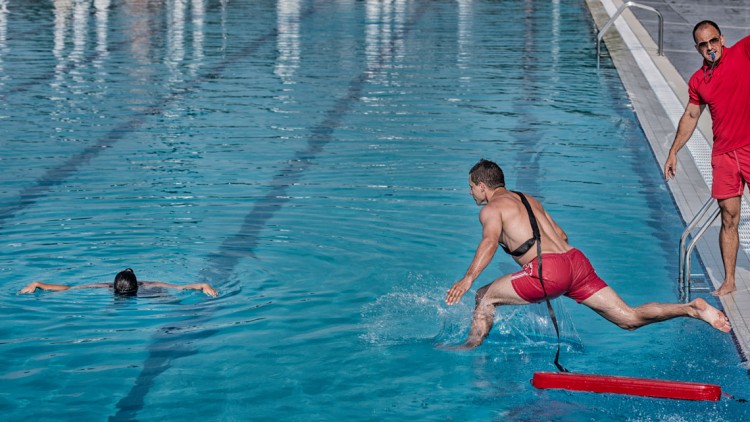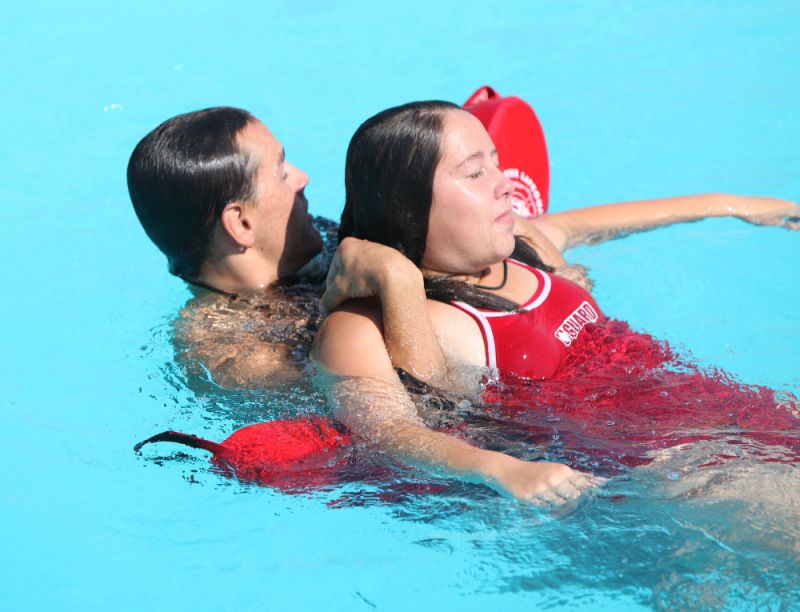Various fields, especially lifeguard training has experienced significant transformations in the digital era. Traditional lifeguard courses have gone through changes that include online components for the certification process to be more flexible and accessible.
This article discusses the importance of online lifeguard courses for modern training, pointing out their advantages, structure, costs and career opportunities.

Introduction to Online Lifeguard Course
Previously, lifeguard training was mainly done physically with emphasis on practicality. Although this approach is still crucially important; inclusion of online lifeguard course presents some advantages. These programs combine theoretical knowledge with hands-on practice so as to ensure holistic learning on behalf of a lifeguard.
The Evolution of Lifeguard Training
Traditional Lifeguard Training
Traditional lifeguard training entails physical classes where participants acquire primary skills such as water rescue techniques, CPRs and first aid skills. These are usually conducted locally at pools or beaches and community centers hence require people to go at specific times.
The Rise of Online Lifeguard Courses
Incorporation of various online aspects during lifesaver preparation program has completely transformed learning experiences. There are several advantages associated with online life saver courses:
- Accessibility: Course materials can be accessed from any location therefore opening up training opportunities to more people.
- Flexibility: Learners can study whenever they want through internet platforms.
- Cost effectiveness: The cost involved when using electronic systems instead of travelling is lower compared to traditional means.
Key Components of an Online Lifeguard Course
Typically, online lifesaving course consists two main parts i.e., theoretical knowledge and practical skills.
Theoretical Knowledge
The theoretical part includes basic topics such as:
- Water Safety Principles: Understanding the fundamentals of water safety and prevention.
- CPR and First Aid: Learning how to perform CPR and provide first aid in emergencies.
- Rescue Techniques: Gaining knowledge about various rescue methods as well as when to use them.
- Legal Responsibilities and Ethical Considerations: Knowing the legal ramifications and ethical duties of a lifeguard.
Video lectures, interactive modules and quizzes are included to ensure that the students understand and retain this information.
Practical Skills
Practical skills on the other hand need physical demonstrations since they involve actual work. Online lifesaving courses usually encompass:
- Virtual Simulations and Scenarios: This is where technology is used to simulate real-life rescue scenarios.
- In-Person Practical Sessions: These are practical sessions scheduled within local facilities for hands-on experiences.
- Hybrid Models: The combination of theory through online means with practice being done in person achieves a balance.
Benefits of Online Lifeguard Courses
Improved Learning Experiences
Online life guarding classes utilize some multimedia tools that make learning engaging and more interactive. Virtual simulations and scenario-based training enable learners to comprehend and engage in the lifeguarding techniques as well as decision making processes.
Flexibility and Convenience
The main benefit associated with e learning programs for lifesavers lies in their flexibility. Therefore, participants are able to refer back to course materials at any time even as they juggle them between other aspects such as employment or school work.
Accessibility
Web-based learning has broken geographical barriers; thus, people from remote or neglected areas can be trained as good lifeguards without travelling very far away for it.
Cost-Effectiveness
Mostly, online life guard courses tend to cost less than traditional face-to-face ones because they do not require brick-and mortar classrooms but rather virtual ones. Due to this fact many people can afford it.

The Make-up of an Online Lifeguard Course
Enrollment and course layout
Online lifeguarding courses usually have a simple registration process. Learners enroll through an online platform, receive course materials, and take up the structured learning path.
Interactive Learning Modules
Different modules constitute a full course covering various subjects. Such modules contain video lectures, readings for students, interactive quizzes and virtual models. When studying different approaches to learning simultaneously students use many types of educational information.
Practical Sessions
Although conducted online, practical training is still important. Online lifeguard courses partner with local facilities to provide hands-on practice sessions. Certificates are issued only after completing these practical components.
How long does it take to complete a lifeguard class?
This will depend on the course that one chooses to take. Generally, internet-based lessons last about 20-30 hours followed by some live practices in person at the school or outside institutions. The flexible nature of this structure allows participants’ rate of completion vary.
How much money should I pay for a lifeguard class?
The cost for taking any such program may greatly differ due to location factors among others like whether one is doing it online or physically attending classes.During online studies, at least $150 might be charged excluding other charges that arise based on premium courses than can cost extra.Online training programs are more affordable thereby attracting more prospective guards because they offer better value for their money in terms of content delivery methods and knowledge level attained.
Prospects for advancement and employment options
Entry-level Lifeguard Positions
Achievement of this program paves way for beginners into swimming pool attendants who guard people’s lives at water bodies such as oceans and lakes as well as amusement parks.Managers therefore find it easy hiring them owing to their qualifications representing them in interviews and even making direct appointments into different areas relating to guarding lives which include swimming pools where they acquire experience from time.
Lifeguard Instructor Courses
There are lifeguard instructor courses for those interested in growing their careers. Instructors of this kind facilitate the training of lifeguards as well as other services provided by them within aquatic facilities.
Specialized Lifeguard Training
To advance in career, one can take up specialized training such as waterfront lifeguarding or even facility management. These programs go beyond the basic lifesaving skills taught at a typical lifeguard course and provide a way for an individual to have specific focus.

The Impact of Online Lifeguard Courses on Modern Training
Online lifeguard courses have had these effects on contemporary training:
- Increased access: Opening up swimming pool attendant lessons to a wider market.
- Enhanced flexibility: Allowing swimmers to learn at their own pace.
- Improved engagement: Using mix-media sources to enable students to actively participate.
- Reduced costs: Brought down expenses that were previously unaffordable for prospective guards
Challenges and Solutions
Ensuring Practical Competency
One problem with online lifeguard classes is the lack of application exposure. This can be overcome through hybrid models that combine theory learned online with practice sessions done physically or virtually based scenarios of how real life situations would result into which is one way ensuring that e-learning also has practical aspects attached to it like offline trainings normally do.
Maintaining Course Quality
It’s crucial that online life saving classes should still preserve their value. To ensure uniformity in standards, accreditation agencies vet these institutions and come up with curriculum guidelines through which they will operate so as not compromise on quality issues relating to both traditional and web-based learning approaches where possible considering different types of programs offered over internet.
Final Words
Online Lifeguard course for life-saving are among the latest trends in modern education that offer flexibility, accessibility, and affordability. By combining theoretical knowledge acquired through distance learning materials with physical practices done inside swimming pools/ other places where participants will get first hand experience, such classes provide comprehensive knowledge about being a good rescuer. As technology advances, internet-based lifeguard programs will play a big role in aquatic safety training hence ensuring that they are more adaptable to different settings where these professionals find themselves in.